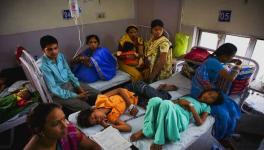Kerala Set to Become First State to Be Free of Tuberculosis
Image for representational use only.Image Courtesy: TheHealthSite.com
After years of numerous experiments and active campaigning among the doctors, public health activists and patients, Kerala may become the first state in the country to be Tuberculosis-free.With the successful identification of over 25 lakh individuals through vulnerability mapping, the state is preparing to treat all the individuals suffering from latent TB infection with preventive medication with 12 doses of Rifapentin and Isoniazid.
A latent TB-affected person is the one who has presence of the bacteria in the body without any symptoms of the disease. The individual is only treated as an 'active case' when he is capable of spreading the infection to other people. The strategy of neutralising the bacteria is one among many recommended by the World Health Organisation to prevent the spread of Tuberculosis across the world.
The programme may become a beacon of hope for other states, as India accounts for 27 per cent of all Tuberculosis patients all over the world. Additionally, WHO data suggests that the disease claimed lives of more than 4 lakh people in 2017 across the country. The continuing success of the programme is also reflected in the reduced incidence rate of disease which was measured at 44 cases per 1,00,000 people, whereas the national average remained at 204 cases per 1,00,000 people. WHO recommends TB elimination at the rate of less than 1 case per million persons.
The state model for eradicating Tuberculosis consisted of several layers including the mapping of vulnerability among people with chances of becoming active TB cases and involvement of private sector in notifying the patients to ensure proper and adequate medication to prevent drug-resistant forms of TB and spread of the infection.
Also Read: How Kerala is Fighting TB, and Winning
Talking to Newsclick, K P Aravindan, a pathologist and retired professor from Calicut Medical College, said that the state has, so far, succeeded in identifying the vulnerable sections with a possibility of infection. Aravindan, who treated TB patients for more than three decades, said, "The pockets of vulnerability like tribal communities were very important. I have been treating patients with complaints of infertility due to Tuberculosis. In comparison with early days of my practice, I rarely see any patient with a similar complaint. This has only become possible because TB has significantly reduced in last 10-12 years."
The example of Idduki district is often cited, as many tribal communities live in the hills and it explains how strengthening of public infrastructure also helps in prevention of the disease. The district detected only 17 TB cases per 100,000 population in 2006, which was below expectation as per the Revised National Tuberculosis Control Programme (RNTCP)- the national program aimed at eradicating TB. However, the scenario completely changed when the district TB cell filled all vacant positions of medical officers and laboratory technicians for improving access to diagnosis and treatment. This resulted in steep hike in incidence rate but settled on 51 persons per 1,00,000 persons.
He added that the treatment of TB is also linked with improvement of social conditions. Experts maintain that the factor was first noticed in London which had a very higher rate of incidence but it reduced significantly owing to reduction in poverty and improvement in social conditions.
To the question of involvement of private sector in notifying the patients, Aravindan said that nearly 60 to 70 per cent patients are treated in private sector, but the reporting from private hospitals was very poor. The private sector was taken on board to ensure that the patients not only get proper treatment, but drug resistance cases also come down.
Get the latest reports & analysis with people's perspective on Protests, movements & deep analytical videos, discussions of the current affairs in your Telegram app. Subscribe to NewsClick's Telegram channel & get Real-Time updates on stories, as they get published on our website.
























